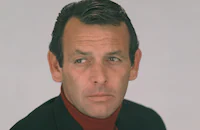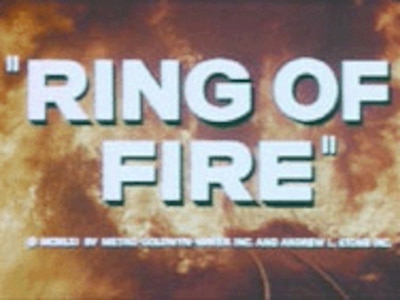Ring of Fire

Brief Synopsis
Cast & Crew
Andrew L. Stone
David Janssen
Joyce Taylor
Frank Gorshin
Joel Marston
James Johnson
Film Details
Technical Specs

Synopsis
In the vast forest region of Oregon, Deputy Sheriff Steve Walsh arrests three teenagers--Bobbie Adams, Frank Henderson, and Roy Anderson--for the holdup of a filling station. En route to jail Bobbie produces a gun from beneath her shirt, and Walsh becomes the trio's prisoner. They abandon the sheriff's car and, by using Walsh as both hostage and guide, set out by foot through the mountainous forestland. When they stop for the night, Bobbie, aware of Walsh's growing interest in her, tries unsuccessfully to seduce him. The next day the drunken Roy tries to push Walsh off the edge of a ravine, but in the struggle Roy himself plunges to his death. Meanwhile, a search party has been organized; and when Walsh, Bobbie, and Frank reach a clearing the police are waiting. Once apprehended, the desperate and vengeful Frank falsely accuses Walsh of being intimate with Bobbie, who is still a minor. Before the argument can be settled, a forest fire breaks out, the result of a lit cigarette carelessly tossed aside by Frank. When the blaze gets out of control and sweeps through the town, Walsh herds the trapped citizens into two railway cars and, aided by Bobbie, drives the locomotive over a 200-foot-high trestle. Midway across, the train stalls, but the townspeople make their way across the ties to safety. In the panic and confusion, Frank escapes from his captors and begins climbing down the trestle. But as Walsh, Bobbie, and the last of the townspeople reach safety, the burning trestle collapses, and Frank is killed as the train crashes into the riverbed below.

Director

Andrew L. Stone
Cast

David Janssen
Joyce Taylor
Frank Gorshin
Joel Marston
James Johnson
Ron Myron
Marshall Kent
Doodles Weaver
Crew
William H. Clothier
Duane Eddy
Duane Eddy
Georgia Pacific Corp.
Franklin Milton
Simpson Timber Co.
Henry Spitz
Henry Spitz
Andrew L. Stone
Andrew L. Stone
Virginia Stone
Virginia Stone
Herman Townsley
United States Army
People Of Vernonia (oregon)
State Of Washington

Videos
Trailer
Hosted Intro
Film Details
Technical Specs

Articles
Ring of Fire
Arguably the most exciting film ever to be shot in Veronica, Oregon. While the story is a bit fanciful, emphasis on fast action and William Clothier's rich, sharp photography (his aerial shots of the fire are first-rate) make for a good "B" picture. The footage of the fires were shot during two real conflagrations that took place in Oregon and California, then cut into the picture and director Stone used the entire town of Veronica for the scenes of escaping citizens in freight cars for authenticity.
For you trivia buffs: Doodles Weaver, who plays Mr. Hobart, is the uncle of actress Sigourney Weaver. Ring of Fire is notably interesting for its director, Andrew L. Stone, who wrote and directed a series of thrillers, all shot on location using natural sounds and the minimum of lighting. He considered studio shooting outdated and wasteful. A pioneer of hand-lamps and radio mics, Stone rejected back projection, process work and even post-synching (dubbing). The technique paid off because whereas most studio pictures averaged eight setups a day, Stone routinely shot 20, shooting all night if he thought it would help the picture. Every scene for his picture Cry Terror (1958) for instance, was shot on location; Stone even took his crew into the New York subway, requiring James Mason to crawl down the inside of a real elevator shaft; and his previous film The Decks Ran Red (1958), was shot on an abandoned freighter. Such tactics lent his movies, which not always had the most believable or tightest of scripts, an element of intensity and atmosphere.
Producer: Andrew L. Stone
Director: Andrew L. Stone
Screenplay: Andrew L. Stone
Cinematography: William H. Clothier
Film Editing: Virginia L. Stone
Art Direction:
Music: Duane Eddy
Cast: David Janssen (Sergeant Steve Walsh), Joyce Taylor (Bobbie Adams), Frank Gorshin (Frank Henderson), Joel Marston (Deputy Joe Pringle), James Johnson (Roy Anderson), Ron Myron (Sheriff Tom Niles).
C-91m.
by Michael T. Toole

Ring of Fire
Frank Gorshin (1933-2005)
He was born on April 5, 1933, in Pittsburgh, Pennsylvania into a family of modest means, his father was a railroad worker and mother a homemaker. His childhood impressions of Edward G. Robinson and James Cagney paid off when he won a local talent contest at 17, and that led to his first gig at 17 at a the prize was a one week engagement at Jackie Heller's Carousel night club, Pittsburgh's hottest downtown spot in the day. The taste was there, and after high school Frank enrolled in the Carnegie-Mellon Tech School of Drama did hone his craft.
His career was interrupted briefly when he entered the US Army in 1953. He spent two years in Special Services as an entertainer. Once he got out, Frank tried his luck in Hollywood. He made his film debut in a forgettable William Holden vehicle The Proud and Profane, but his fortunes picked up soon when he and when he hooked up with American Internation Pictures (AIP). With his charasmatic sneer and cocky bravado that belied his slender, 5' 7" frame, Frank made a great punk villian in a series of entertaining "drive-in" fare: Hot Rod Girl (1956), Dragstrip Girl, Invasion of the Saucer Men, and of course the classic Portland Expose (all 1957).
By the '60s, he graduated to supporting roles in bigger Hollywood fare: Where the Boys Are, Bells Are Ringing (both 1960), Ring of Fire, and his biggest tole to date, that of Iggy the bank robber in Disney's hugely popular That Darn Cat (1965). Better still, Frank found some parts on television: Naked City, Combat!, The Untouchables, and this would be the medium where he found his greatest success. Little did he realize that when his skeletal physique donned those green nylon tights and cackled his high pitch laugh that Frank Gorshin would be forever identified as "the Riddler," one of Batman's main nemisis. For two years (1966-68), he was a semi-regular on the show and it brought him deserved national attention.
By the '70s, Frank made his Broadway debut, as the star of Jimmy, a musical based on the life of former New York City Mayor Jimmy Walker. He spent the next two decades alternating between the stage, where he appeared regularly in national touring productions of such popular shows as: Promises, Promises, Prisoner of Second Street, and Guys and Dolls; and nightclub work in Los Angeles and Las Vegas.
He recently found himself in demand for character roles on televison: Murder, She Wrote, Lois & Clark: The New Adventures of Superman and film: Terry Gilliam's Twelve Monkeys (1995), and the quirky comedy Man of the Century (1999). Yet his biggest triumph was his two year stint (2002-2004) as George Burns in the Broadway smash, Say Goodnight Gracie. It ran for 364 performances and he received critical raves from even the toughest New York theater critics, proving undoubtly that he was a performer for all mediums. He is survived by his wife Christina; a son, Mitchell; grandson Brandon and sister Dottie.
by Michael T. Toole
Frank Gorshin (1933-2005)
Quotes
Trivia
Notes
Filmed in Vernonia, Oregon, and in Washington.

Miscellaneous Notes
Released in United States Summer June 1961
Released in United States Summer June 1961
















